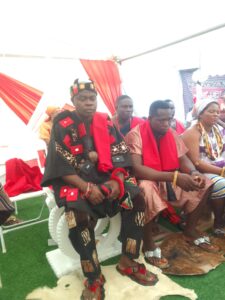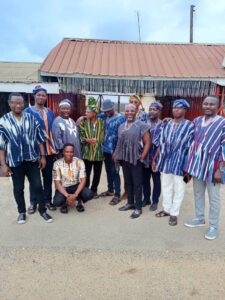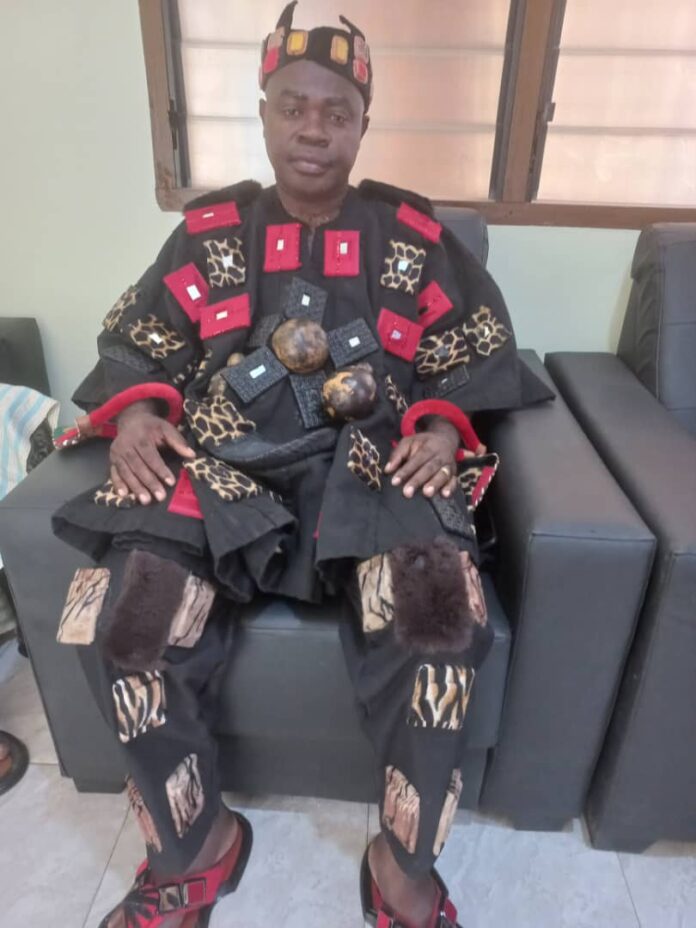A new era of leadership and community transformation has dawned in Mepe as Torgbe Kwabla Asamankwenta IV, the newly installed sub-divisional chief of Gbanvie, formally accepted his traditional authority with a passionate pledge to promote unity, development, and cultural pride.
In a ceremony graced by several dignitaries, the new chief promised to serve with wisdom and compassion while upholding the customs of his people.
“With deep humility and gratitude, I accept the sacred responsibility entrusted to me as Torgbe Asamankweta IV,” he said.
“This moment marks a significant chapter in our history. The stool I ascend today is not merely a symbol of authority, but a living heritage of unity, identity, and service to our people,” he added.

Torgbe Asamankweta, known privately as Nathaniel Adotey, is a senior staff member of the Electricity Company of Ghana with professional experience in auditing and finance.
His installation is seen by many as a bridge between traditional leadership and modern governance, with hopes high that his corporate background will bring a fresh approach to development within the community.
He paid tribute to the ancestors, describing them as visionaries who helped shape Mepe’s moral and intellectual legacy.
The chief recalled how Mepe became a historic site for the Basel Mission and School, which laid the foundation for generations of enlightened leadership.

Looking forward, Torgbe Asamankweta outlined a broad development agenda that includes strengthening education, improving healthcare access, empowering women and youth through skills and entrepreneurship, environmental preservation, and the promotion of cultural heritage.
“I envision a united and vibrant Agudafeme, a prosperous Mepe, a transformed Tongu, and a proud Volta Region,” he declared. “Let this day mark a historic renewal of our shared purpose. Let us rise together, guided by the past, inspired by the present, and united in our pursuit of a brighter future.”
His speech was met with applause and optimism, with many attendees describing the message as a rallying call for collective responsibility and forward-looking leadership.
As the new chief begins his reign, expectations are high that Mepe’s rich traditions will thrive alongside measurable socio-economic progress.

Mepe: A town steeped in tradition and modern civility
Mepe is a historically significant town located in the North Tongu District of the Volta Region of Ghana. It lies along the banks of the Volta River and is one of the principal Tongu settlements in the region.
Traditionally, Mepe is organized into various clans and subdivisions, each headed by a chief. Chieftaincy in Mepe is a revered institution, serving both governance and custodial roles over culture and customs.
Mepe is part of the Tongu Traditional Area and maintains strong cultural links with other Ewe communities.
Mepe holds a special place in Ghana’s educational and religious history. It was one of the early sites where the Basel Mission established schools and churches during the colonial era.
This legacy made Mepe a centre for early literacy and Christian evangelism, producing many prominent scholars, clergy, and public servants.
The town’s proximity to the Volta River has shaped its economy. Fishing, farming, trading, and more recently, employment in public and private sectors, form the backbone of local livelihoods.
The people of Mepe celebrate the Afenorto Festival, a unifying homecoming event marked by traditional rites, drumming, dancing, and reflections on community development.
It serves both as a cultural preservation tool and a call to action for communal progress.
In summary, Mepe is a town steeped in history, resilience, and cultural richness. Its people are known for their strong sense of humour, happiness, even in the face of adversity, commitment to tradition, and contributions to national development.



